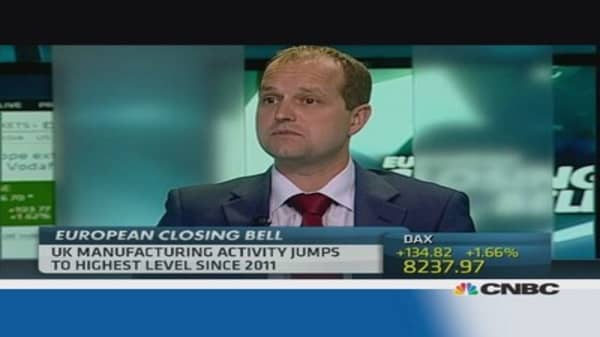It's not just Arsenal fans who have had a particularly good few days (they beat their fiercest rivals and signed one of the world's top young talents), as better-than-expected economic data also gives British Chancellor George Osborne a reason to celebrate.
On Tuesday, figures revealed that construction activity in Britain grew at its fastest pace in almost six years in August. The Markit/CIPS purchasing managers'index (PMI) for the sector came in at 59.1 in August, its highest level since September 2007 and far stronger than analysts expected, with Societe Generale Strategist Kit Juckes predicting that the figure would dip to 56.
"The latest Construction PMI figures are yet another indication that the U.K. economy has performed impressively over the summer months," said Markit Senior Economist Tim Moore. The figures followed Monday's manufacturing PMI figures which also showed a jump activity, hitting a two-and-a-half-year high of 57.2 in August.
(Read more: UK manufacturers see strongest rise in orders in August since 1994)
This encouraging PMI data came a week after official figures revealed that the U.K.'s gross domestic product (GDP) expanded by 0.7 percent in the second quarter from the first. This number once again beat economists' forecasts and put Britain's growth rate on a par with Germany, the so-called powerhouse of Europe.
(Read more: Britain's GDP seen strong—But unsustainable)
"About time too," Alan Clarke, director of fixed income strategy and banking and markets at Scotiabank, told CNBC. "We've been longing for this moment for years. We've got this broad-based improvement so long may it continue."
He added that the summer months had turned all expectations about the U.K. economy and its recovery upside down.
"Full year GDP could be anywhere 1.5 or higher," he said. "At the moment, the consensus is 1.2, and only a few months back in April, consensus thought we'd only see half a percentage point growth. So we're a million miles from where we were literally five minutes ago. "
(Read more: Recovering UK economy shows broader,faster growth)




